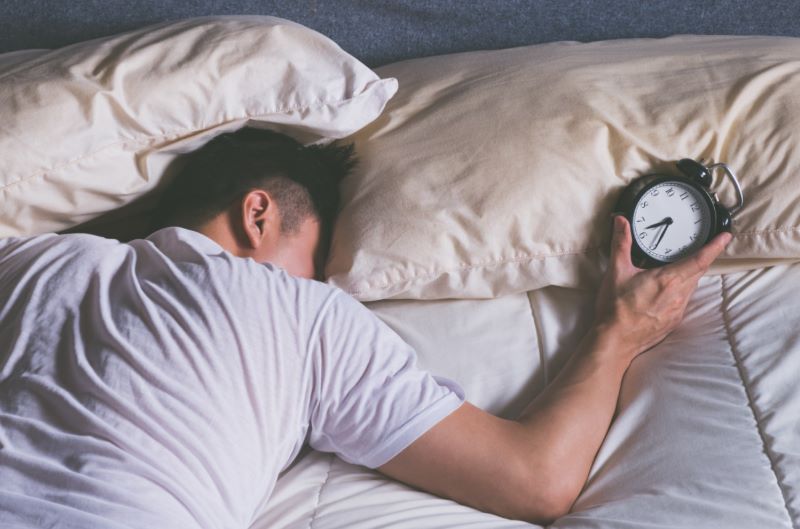Make it stop! Six ways to stop your racing mind and get the sleep you need.

By Dr. Alexander Sweetman
Research Fellow, College of Medicine and Public Health
Flinders University
Introduction
Martin turns off the light to fall asleep, but his mind quickly springs into action. Racing thoughts about work deadlines, his overdue car service, and his father’s recent surgery occupy his mind.
As he struggles to fall asleep, the hours start to creep by. He becomes frustrated about how he will cope tomorrow. This is a pattern Martin has struggled with for many years.
But what’s going on when your mind is racing at night? And how do you make it stop?
It can Happen to Anyone
In bed, with no other visual or sound cues to occupy the mind, many people start to have racing thoughts that keep them awake. This can happen at the start of the night, or when they awake in the night.
The good news is there are effective ways to reduce these racing thoughts, and to help get some sleep. To do this, let’s take a step back and talk about insomnia.
What is Insomnia?
If you are like Martin, you’re not alone. Right now, up to six in every ten people have regular insomnia symptoms. One in ten have had these symptoms for months or years.
Insomnia includes trouble falling asleep at the start of the night, waking up during the night, and feelings of daytime fatigue, concentration difficulties, lethargy or poor mood.
Just like Martin, many people with insomnia find as soon as they get into bed, they feel alert and wide awake. So what’s going on?
The more time we spend in bed doing things other than sleep, the more our brain and body start to learn that bed is a place for these non-sleep activities.
These activities don’t just include worrying. They can be using a mobile phone, watching TV, eating, working, arguing, smoking or playing with pets.
Gradually, our brains can learn that bed is a place for these other activities instead of rest and sleep. Over time the simple act of getting into bed can become a trigger to feel more alert and awake. This is called “conditioned insomnia”.
Here are six ways to spend less time awake in bed with racing thoughts.
1. Re-learn to associate bed with sleep
Stimulus control therapy can help re-build the relationship between bed and sleep.
Follow these simple steps every night of the week:
- only use your bed for sleep and intimacy. All other activities should occur out of bed, preferably in another room
- only go to bed if you are feeling sleepy (when your eyes are heavy and you could easily fall asleep). If you are not feeling sleepy, delay getting into bed. Use this time to do something relaxing in another room
- if you are still awake after about 15 minutes in bed, get out of bed and go to another room. Do something else relaxing until you are feeling sleepy again, such as reading a book, listening to the radio, catching up on some chores or doing a crossword puzzle. Avoid anything too stimulating such as work or computer gaming
- repeat the above two steps until you are asleep within about 15 minutes. This can take several cycles of getting in and out of bed. But during this time, you body’s natural need for sleep will increase, and you will eventually fall asleep within 15 minutes of getting into bed
- get out of bed at the same time each morning, no matter how much you slept the night before
- avoid long daytime naps, which can make it harder to fall asleep that night.
Over several nights, this therapy builds the relationship between bed and sleep, and reduces the relationship between bed and feeling alert and having racing thoughts.

2. Distract Yourself with fond Thoughts
Negative thoughts in bed or worrying about the consequences of losing sleep can make us feel more alert, worried, and make it more difficult to sleep.
So try something called “cognitive re-focusing”. Try to replay a fond memory, movie, or TV show in your mind, to distract yourself from these negative thoughts.
Ideally, this will be a memory you can recall very clearly, and one that causes neutral or slightly positive feelings. Memories that are overly positive or negative might cause an increase in alertness and mental activity.
3. Relax into sleep
Relaxation therapy for insomnia aims to reduce alertness and improve sleep.
One way is to progressively tense and relax muscle groups throughout your body, known as guided progressive muscle relaxation therapy.
You could also try breathing exercises, soothing music, visual imagery or other relaxation exercises that feel right for you.
Part of relaxing into sleep is avoiding doing work in the late evening or screen-based activities right before bed. Give yourself a “buffer zone”, to allow yourself time to start relaxing before getting into bed.
4. Worry Earlier in the day
Schedule some “worry time” earlier in the day, so these thoughts don’t happen at night. It can also help to write down some of the things that worry you.
If you start to worry about things during the night, you can remind yourself you have already written them down, and they are waiting for you to work through during your scheduled “worry time” the next day.
5. Know Waking in the Night is Normal
Knowing that brief awakenings from sleep are completely normal, and not a sign of ill health, may help.
Sleep occurs in different “cycles” during the night. Each cycle lasts for about 90 minutes, and includes different stages of light, deep, and dreaming (REM) sleep.
Most of our deep sleep occurs in the first half of the night, and most of our light sleep in the second half.
Everyone experiences brief awakenings from sleep, but most people don’t remember these the next morning.
6. What if these don’t work?
If these don’t work, the most effective next step is “cognitive behavioural therapy for insomnia” or CBT-i.
This non-drug therapy targets the underlying causes of insomnia, and leads to long-lasting improvements in sleep, mental health and daytime function.
You can do a self-guided online program, or access it via your GP or a psychologist. More details, including links to online programs, are available via the Sleep Health Foundation.
We are providing free access to online CBT-i through a research study. To find out more, contact me.
The Sleep Health Foundation has several evidence-based resources about sleep health and insomnia.
Originally published by The Conversation, 07.10.2023, under the terms of a Creative Commons Attribution/No derivatives license.






